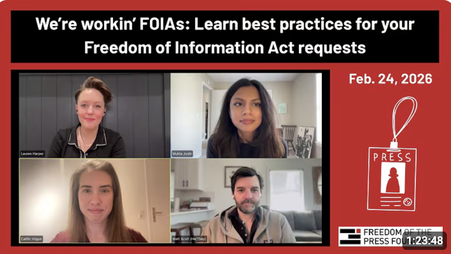Dear Friend of Press Freedom,
I’m Lauren Harper, the first Daniel Ellsberg chair on government secrecy at Freedom of the Press Foundation (FPF), and welcome to “The Classifieds.” Read on to learn about this week’s top secrecy news.
FPF sues over Qatari jet secrecy
FPF, represented by American Oversight, sued the Justice Department this week over the agency’s refusal to release its legal memo justifying the Trump administration’s acceptance of Qatar’s $400 million luxury jet. Attorney General Pam Bondi reportedly found this bribe gift “legally permissible” as long as the jet was transferred to the Trump presidential library foundation at the end of his term.
We brought the Freedom of Information Act lawsuit after the Justice Department told us it would take over 600 days to process our request for a single, time-sensitive document. This egregious delay is a prime example of the government’s continued inability to administer FOIA and highlights how nonexistent disclosure rules around donations to presidential libraries provide easy cover for bad actors and potential corruption.
Chioma Chukwu, executive director of American Oversight, said, “This is precisely the kind of corrupt arrangement that public records laws are designed to expose. The DOJ cannot sit on its hands and expect the American people to wait years for the truth while serious questions about corruption, self-dealing, and foreign influence go unanswered.”
The lawsuit was filed the same week the Department of Defense announced that Defense Secretary Hegseth had signed a memorandum of understanding with his Qatari counterpart that the U.S. would accept the plane as an “unconditional donation.” (We filed a request for that memo, too.)
And if you’re wondering how much it will cost the Pentagon to renovate the Qatari plane to meet Air Force One’s security standards, you’re out of luck. That’s classified.
Our “Top 10” FOIAs
FPF has filed over 100 FOIA requests so far this year in an aggressive effort to learn how the Trump administration is targeting journalists and stifling dissent. These include requests for:
- Information on Department of Homeland Security Secretary Kristi Noem’s threats to prosecute CNN for reporting on an app that lets users track Immigration and Customs Enforcement agents,
- ICE’s use of an app that will drastically expand its facial surveillance capabilities,
- Emails from the Director of National Intelligence’s office that reportedly show agency political appointees pressuring career intelligence officials to produce reports that corroborate President Donald Trump’s public statements.
If you’d like to help support our FOIA effort, you can donate here or contact FPF Director of Development John Halpin at [email protected]. Or, if you are a FOIA lawyer who is interested in working with us pro bono or for a reduced fee on FOIA litigation, you can contact me at [email protected].
FPF on NPR
I visited NPR’s “1A” program this week to discuss the Trump administration’s targeting of whistleblowers and the press. I was joined by Hampton Dellinger, the unjustly fired head of the Office of Special Counsel, and topics ranged from debunking the government’s claims that whistleblowers endanger national security, to how the outdated, overbroad Espionage Act puts whistleblowers and reporters at risk.
What I'm Reading
In the US, a factual National Archives still exists — but for how long?
Anna Nemzer, journalist and co-founder of the Russian Independent Media Archive, has advice for Americans asking how they can help preserve democracy: “Safeguard your independent media and defend your national archives.” Why? Trump’s attack on the National Archives isn’t without historical precedence — and it could get worse. In 2004, Russian president Vladimir Putin signed the federal archives law, which labels broad categories of records as “state secrets,” restricting them from public view. Lack of government information, combined with a press beholden to the government, creates an environment that allows dictators to thrive.
Senate panel advances bills to protect whistleblowers, fix CBP workers’ retirement benefits
The Senate Homeland Security and Government Affairs Committee unanimously advanced a bill that would increase whistleblower protections for federal contractors and subcontractors. It’s an important gap that needs to be closed, and a reminder that military personnel, intelligence community employees, and political appointees are among the groups whose whistleblower protections are not robust enough.
The short-lived plan to produce a Trump-themed Instant Pot
The Trump Organization has killed Instant Pot’s attempt to sell a MAGA-themed version of the device, even though portions of the proceeds were reportedly promised to go towards Trump’s presidential library foundation. Instant Pot’s owner, Centre Lane Partners, had hoped the gimmick “would help with tariffs and a looming antitrust inquiry” but failed to seek the Trump Organization’s permission.





